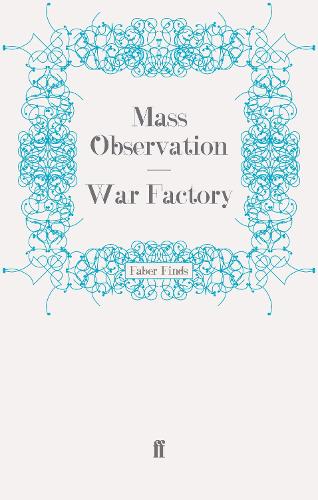
War Factory
(Paperback, Main)
Publishing Details
War Factory
By (Author) Mass Observation
By (author) Celia Fremlin
Faber & Faber
Faber & Faber
16th April 2009
Main
United Kingdom
Classifications
General
Non Fiction
331.76213848094209044
Physical Properties
Paperback
128
Width 198mm, Height 126mm, Spine 9mm
148g
Description
Mass Observation was founded by Tom Harrisson, Charles Madge and Humphrey Jennings in 1937. Its purpose was to create 'an anthropology of ourselves' in other words, to study the everyday lives of ordinary people in Britain. Discounting an initial pamphlet, this was the tenth book to be published. It appears in Faber Finds as a part of an extensive reissue programme of the original Mass Observation titles. originally published in 1943. It was largely the work of one 'observer', Celia Fremlin, also known as a thriller writer. It records the experiences and attitudes of women war workers in one particular factory just outside Malmesbury, Wiltshire specializing in the making of radar equipment (neither location nor purpose are, of course, revealed in the book). the book as the 'first coherent and serious study' of a wartime industrial community lodged in the middle of the countryside. The Manchester Guardian called it 'a remarkable study' and the Sunday Times 'a fascinating examination'. The Daily Herald having pointed out 'the girls were grossly - and it would seem, indefensibly - overworked went on to say 'What is certain is that those who are responsible for maintaining the rhythm of war production in the fifth year of war will find no adequate solution to war-weariness if they ignore the penetrating human facts which are brought to light in such investigations as are recorded in this important book.'
Author Bio
Mass Observation was founded in 1937 by Tom Harrission, Charles Madge and Humphrey Jennings. Its purpose was to create an 'anthropology of ourselves', in other words, to provide a study of the everyday lives of ordinary people in Britain. In its first period, from 1937 to 1950, it published twenty-two books, many of which are being reissued in Faber Finds. These books constitute a unique social history of the period. Since 1970 the Mass Observation Archive has been at Sussex University. In 1981 the New Mass Observation Project was born. It is run from the Archive under the direction of Dorothy Sheridan. The Archive is a magnificent resource which continues to provide rich material for books. Recent publications have included Nella Last's War, Nella Last's Peace, Our Longest Days (all published by Profile) and three selections of Mass Observation Diaries of the Second World War and just after , edited by Simon Garfield and published by Ebury Press. Celia Fremlin (1914-2009) was born in Kent and spent her childhood in Hertfordshire, before studying at Oxford (whilst working as a charwoman). During World War Two, she served as an air-raid warden before becoming involved with the Mass Observation Project, collaborating on a study of women workers, War Factory. In 1942 she married Elia Goller, moved to Hampstead and had three children. In 1968, their youngest daughter committed suicide aged 19; a month later, her husband also killed himself. In the wake of these tragedies, Fremlin briefly relocated to Geneva. In 1985, she married Leslie Minchin, with whom she lived until his death in 1999. Over four decades, Fremlin wrote sixteen celebrated novels - including the classic summer holiday seaside mystery Uncle Paul (1959) - one book of poetry and three story collections. Her debut The Hours Before Dawn won the Edgar Award in 1960.
